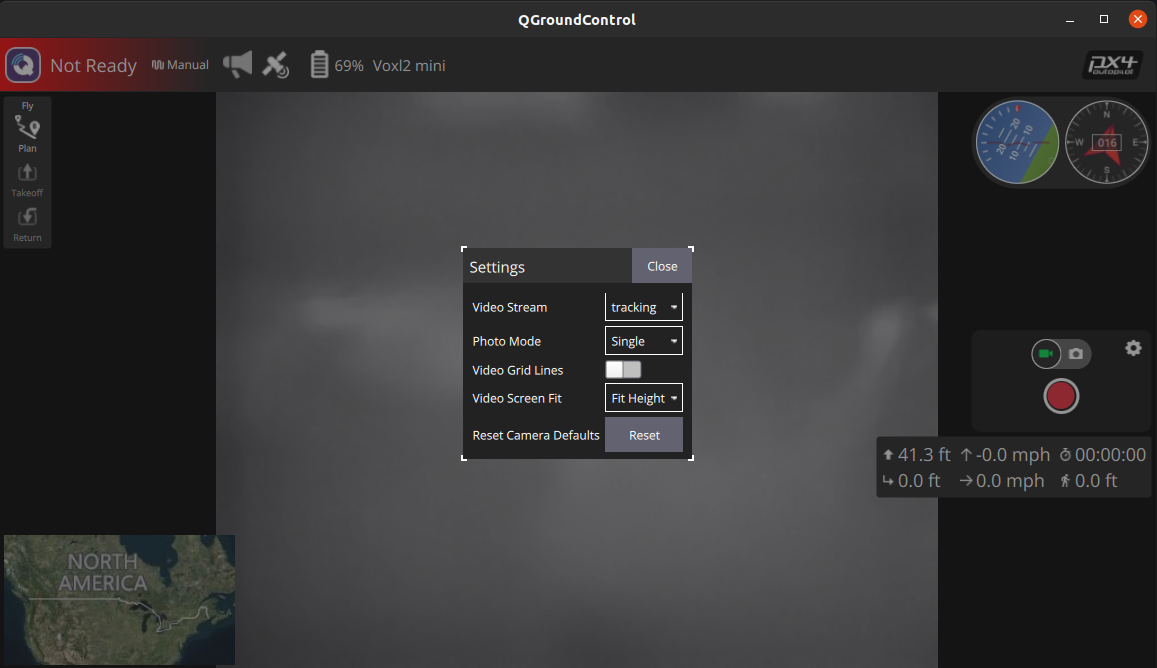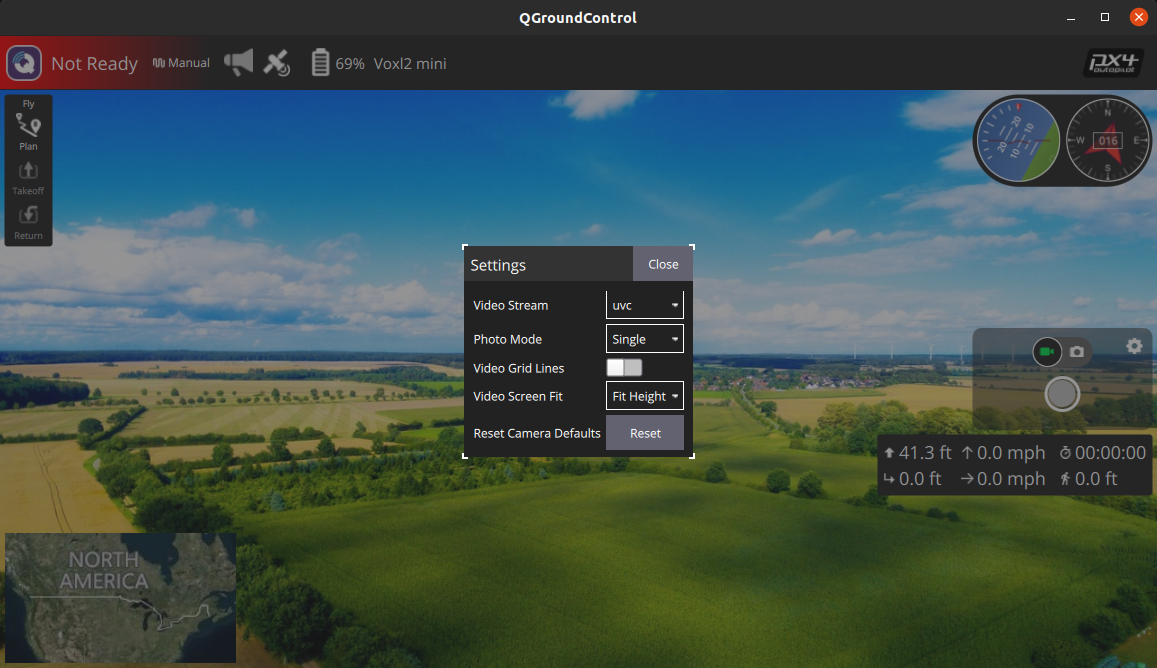Hello, I have been trying to get my model converted using the script on the deep learning page of the docs but have been unsuccessful in doing so. Here is the code I have been using:
# IF ON VOXL 1, MAKE SURE TF VERSION IS <= 2.2.3
# i.e., pip install tensorflow==2.2.3
import tensorflow as tf
# if you have a saved model and not a frozen graph, see:
# converter = tf.compat.v1.lite.TFLiteConverter.from_saved_model()
tf.compat.v1.enable_control_flow_v2()
# INPUT_ARRAYS, INPUT_SHAPES, and OUTPUT_ARRAYS may vary per model
# please check these by opening up your frozen graph/saved model in a tool like netron
converter = tf.compat.v1.lite.TFLiteConverter.from_frozen_graph(
graph_def_file = '/home/sam/Desktop/model_to_convert/frozen_inference_graph.pb',
input_arrays = ['image_tensor'],
input_shapes={'image_tensor': [1,300,300,3]},
output_arrays = ['detection_boxes','detection_scores','num_detections','detection_classes']
)
# IMPORTANT: FLAGS MUST BE SET BELOW #
converter.use_experimental_new_converter = True
converter.allow_custom_ops = True
converter.target_spec.supported_types = [tf.float16]
tflite_model = converter.convert()
with tf.io.gfile.GFile('model_converted.tflite', 'wb') as f:
f.write(tflite_model)
The errors I receive are:
2025-03-20 09:57:55.030795: I tensorflow/core/util/port.cc:153] oneDNN custom operations are on. You may see slightly different numerical results due to floating-point round-off errors from different computation orders. To turn them off, set the environment variable `TF_ENABLE_ONEDNN_OPTS=0`.
2025-03-20 09:57:55.038034: E external/local_xla/xla/stream_executor/cuda/cuda_fft.cc:467] Unable to register cuFFT factory: Attempting to register factory for plugin cuFFT when one has already been registered
WARNING: All log messages before absl::InitializeLog() is called are written to STDERR
E0000 00:00:1742489875.046979 73285 cuda_dnn.cc:8579] Unable to register cuDNN factory: Attempting to register factory for plugin cuDNN when one has already been registered
E0000 00:00:1742489875.049574 73285 cuda_blas.cc:1407] Unable to register cuBLAS factory: Attempting to register factory for plugin cuBLAS when one has already been registered
W0000 00:00:1742489875.056635 73285 computation_placer.cc:177] computation placer already registered. Please check linkage and avoid linking the same target more than once.
W0000 00:00:1742489875.056657 73285 computation_placer.cc:177] computation placer already registered. Please check linkage and avoid linking the same target more than once.
W0000 00:00:1742489875.056658 73285 computation_placer.cc:177] computation placer already registered. Please check linkage and avoid linking the same target more than once.
W0000 00:00:1742489875.056660 73285 computation_placer.cc:177] computation placer already registered. Please check linkage and avoid linking the same target more than once.
2025-03-20 09:57:55.059151: I tensorflow/core/platform/cpu_feature_guard.cc:210] This TensorFlow binary is optimized to use available CPU instructions in performance-critical operations.
To enable the following instructions: AVX2 AVX_VNNI FMA, in other operations, rebuild TensorFlow with the appropriate compiler flags.
2025-03-20 09:57:56.025478: E external/local_xla/xla/stream_executor/cuda/cuda_platform.cc:51] failed call to cuInit: INTERNAL: CUDA error: Failed call to cuInit: UNKNOWN ERROR (303)
WARNING: All log messages before absl::InitializeLog() is called are written to STDERR
W0000 00:00:1742489876.400603 73285 tf_tfl_flatbuffer_helpers.cc:365] Ignored output_format.
W0000 00:00:1742489876.400628 73285 tf_tfl_flatbuffer_helpers.cc:368] Ignored drop_control_dependency.
Traceback (most recent call last):
File "/home/sam/Desktop/model_to_convert/convert.py", line 24, in <module>
tflite_model = converter.convert()
^^^^^^^^^^^^^^^^^^^
File "/home/sam/miniconda3/lib/python3.12/site-packages/tensorflow/lite/python/lite.py", line 3385, in convert
return super(TFLiteConverter, self).convert()
^^^^^^^^^^^^^^^^^^^^^^^^^^^^^^^^^^^^^^
File "/home/sam/miniconda3/lib/python3.12/site-packages/tensorflow/lite/python/lite.py", line 1250, in wrapper
return self._convert_and_export_metrics(convert_func, *args, **kwargs)
^^^^^^^^^^^^^^^^^^^^^^^^^^^^^^^^^^^^^^^^^^^^^^^^^^^^^^^^^^^^^^^
File "/home/sam/miniconda3/lib/python3.12/site-packages/tensorflow/lite/python/lite.py", line 1202, in _convert_and_export_metrics
result = convert_func(self, *args, **kwargs)
^^^^^^^^^^^^^^^^^^^^^^^^^^^^^^^^^^^
File "/home/sam/miniconda3/lib/python3.12/site-packages/tensorflow/lite/python/lite.py", line 3009, in convert
return super(TFLiteFrozenGraphConverter, self).convert()
^^^^^^^^^^^^^^^^^^^^^^^^^^^^^^^^^^^^^^^^^^^^^^^^^
File "/home/sam/miniconda3/lib/python3.12/site-packages/tensorflow/lite/python/lite.py", line 2609, in convert
result = _convert_graphdef(
^^^^^^^^^^^^^^^^^^
File "/home/sam/miniconda3/lib/python3.12/site-packages/tensorflow/lite/python/convert_phase.py", line 212, in wrapper
raise converter_error from None # Re-throws the exception.
^^^^^^^^^^^^^^^^^^^^^^^^^^^^^^^
File "/home/sam/miniconda3/lib/python3.12/site-packages/tensorflow/lite/python/convert_phase.py", line 205, in wrapper
return func(*args, **kwargs)
^^^^^^^^^^^^^^^^^^^^^
File "/home/sam/miniconda3/lib/python3.12/site-packages/tensorflow/lite/python/convert.py", line 885, in convert_graphdef
data = convert(
^^^^^^^^
File "/home/sam/miniconda3/lib/python3.12/site-packages/tensorflow/lite/python/convert.py", line 350, in convert
raise converter_error
tensorflow.lite.python.convert_phase.ConverterError: Merge of two inputs that differ on more than one predicate {s(Postprocessor/BatchMultiClassNonMaxSuppression/map/while/PadOrClipBoxList/Greater:0,else), s(Postprocessor/BatchMultiClassNonMaxSuppression/map/while/PadOrClipBoxList/cond/cond/pred_id/_61__cf__64:0,then), s(Postprocessor/BatchMultiClassNonMaxSuppression/map/while/PadOrClipBoxList/cond/Greater/_60__cf__63:0,then)} and {s(Postprocessor/BatchMultiClassNonMaxSuppression/map/while/PadOrClipBoxList/Greater:0,else), s(Postprocessor/BatchMultiClassNonMaxSuppression/map/while/PadOrClipBoxList/cond/cond/pred_id/_61__cf__64:0,else), s(Postprocessor/BatchMultiClassNonMaxSuppression/map/while/PadOrClipBoxList/cond/Greater/_60__cf__63:0,else)}
for node {{node Postprocessor/BatchMultiClassNonMaxSuppression/map/while/PadOrClipBoxList/cond/cond/Merge}}
Failed to functionalize Control Flow V1 ops. Consider using Control Flow V2 ops instead. See https://www.tensorflow.org/api_docs/python/tf/compat/v1/enable_control_flow_v2.
I am using tensorflow 2.19.0 and python version 3.12.4. My model is mobilenetv1 ssd that i trained on a custom dataset a couple of years ago.
If for some reason it isnt possible, or if it would just be easier, if anyone knows of a good jupyter notebook for training a new mobilenetv1 ssd model on a custom data set, i would appreciate a link to it.

